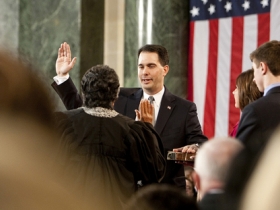How Scott Walker Got Snookered
Excerpt from new book describes how Walker was fooled by a phone call from a blogger posing as conservative billionaire David Koch.

Gov. Scott Walker
The phone call was a long shot, but Ian Murphy wasn’t afraid of those. The blogger and self-described art school dropout telephoned Governor Scott Walker’s office on February 22, 2011, and said he was David Koch, billionaire businessman, donor to conservative causes, and arch-bogeyman of the left. As throughout the crisis, the most outlandish of all possible scenarios occurred—the hoax worked and the call produced damaging, though not ultimately deadly, revelations about the governor. No one was more surprised than Murphy, who as the editor of the satirical website The Beast specialized in outrageous articles and stunts. In a piece published on the one-year anniversary of his phone call to Walker, Murphy recalled that he conceived of the idea after waking at midnight on Tuesday, February 22, and sitting up the rest of the night drinking coffee and smoking a joint. Murphy may not be an entirely reliable storyteller—after his prank broke he told journalists that he was thirty-three years old when he was apparently only thirty-two. “I’d plain forgotten how old I was,” he wrote later. But according to his account, Murphy originally had planned to impersonate the ousted Egyptian leader Hosni Mubarak and call to offer Walker his support, but realized in time that was not much of a plan, especially for someone who didn’t know how to fake an Egyptian accent.
So Murphy settled instead on Koch (pronounced “Coke”). The blogger had read comments by Senator Tim Carpenter, a Milwaukee Democrat who said the governor would not return calls from the absent senators in Illinois. Maybe, Murphy thought, the governor would talk to David Koch. He knew that the political action committee for the company owned by Koch and his brother Charles was also one of the biggest donors to Walker’s 2010 campaign. Even before the prank call, the Kochs’ company and its owners had drawn sharp criticism from demonstrators at the Capitol for their support of the Tea Party and Americans for Prosperity. Protesters’ signs derided Walker and the Fitzgerald brothers as “Koch whores” addicted to corporate campaign cash.
A source close to the governor said later that this story had been given to someone else in Walker’s office, not Gilkes, but in any case the chief of staff told Murphy to call back at 2 p.m. that same afternoon. At that moment, Walker’s green aides were contending with pandemonium at the Capitol and the total breakdown of their plan to pass his union legislation, so checking on the governor’s callers wasn’t as high a priority as it should have been. Plus, Wisconsin was for the moment a center of the national and international news; famous figures were showing up in Madison and weighing in on the events on a daily basis. Why not David Koch?
By midafternoon, Murphy was astounded to find himself talking to Walker. He hadn’t expected to get through and said later he was “wildly unprepared” for the call. Murphy didn’t know how well Walker and Koch might know each other. In fact—and this was key for the prank to work—the two had never talked, though they later would as Walker became a national force in conservative politics. On Murphy’s recording of the conversation, Walker greeted his caller with an upbeat, “Hey, David.” Murphy adopted a terse, gruff voice for his prank, a kind of clichéd CEO persona. Throughout the call, he asked mostly generic questions and let the governor take the lead. When Murphy did speak, he often made bizarre asides that might have been expected to raise the governor’s suspicions. But Walker spoke to him at length with little prompting and seemingly no alarm. He updated Murphy on where the bill stood in the legislative process and explained that Republicans were doing whatever they could to pressure the Democratic senators in Illinois to return. Later that day, Walker said, Republicans would publicly announce that pay for the Democrats would no longer be deposited in their bank accounts and would have to be picked up on the Senate floor.
“Each day we’re going to ratchet it up a little bit,” Walker said.
“Now you’re not talking to any of these Democrat bastards, are you?” Murphy asked, goading Walker as he would throughout the conversation.
The governor gave no reaction to that and told Murphy that he had talked over the weekend for forty-five minutes with Senator Tim Cullen of Janesville. He called the moderate Democrat “about the only reasonable one there.”
“All right, I’ll have to give that man a call,” Murphy said.
“Well, actually, in his case I wouldn’t call him and I’ll tell you why: He’s pretty reasonable, but he’s not one of us. . . . He’s not a conservative. He’s just a pragmatist,” Walker said.
Continuing to share more private details of his plans, Walker said that in two days he would announce potential layoffs for as many as 6,000 state workers. He said he was putting out the word that he wouldn’t give in.
“If you’re doing the right thing, you stay firm. In this case, we’ll wait it out. If they want to start sacrificing thousands of public workers who will be laid off, sooner or later there’s going to be pressure on these senators to come back.”
“Beautiful,” Murphy replied.
The governor told Murphy he talked to GOP legislative leaders every night and asked for “a list of the people I need to call at home, to shore ’em up.” The governor said there were about a dozen of these wavering lawmakers that he worried about. Walker went on to tell Murphy about his recent television appearances on Good Morning America, The Sean Hannity Show, Morning Joe, and On the Record with Greta Van Susteren.
“I talk to [Ohio Governor John] Kasich every day,” Walker volunteered. “John’s got to stand strong in Ohio. I think we can do the same thing with Rick Scott in Florida. I think [Rick] Snyder if he got a little more support could probably do that in Michigan. You start going down the list, you know, there’s a lot of us new governors who got elected to do something big.”
“You’re the first domino.”
“Yep,” Walker replied. “This is our moment.”
“Now what else could we do for you down there?” Murphy asked.
The governor said the first thing that he needed was more people calling GOP lawmakers with their support to combat the message that the tens of thousands of protesters at the Capitol were sending each day.
“The other is more long term and that is after this, you know, in the coming days and weeks and months ahead, particularly in some of these more swing areas, a lot of these guys are going to need—they don’t necessarily need ads out for them, but they’re going to need a message out about reinforcing why this was a good thing to do for the economy, a good thing to do for the state,” Walker said. “So the extent that message is out over and over again, that’s obviously a good thing.”
Walker was talking about two activities that Koch’s Americans for Prosperity specialized in. The first was finding motivated conservatives to demonstrate and volunteer, and the second was shelling out large sums of money for television and radio ads. In the months following the call between Walker and Murphy, Americans for Prosperity spent $530,000 on ads to help the governor and Republicans in the first round of Senate recall campaigns. More came months later when Walker himself faced recall. After the Murphy call was released, Democrats said that Walker was violating the law by trying to coordinate with an independent group on a political campaign. Complaints to ethics investigators on this point were rejected because Walker’s generic advice to the fake Koch wasn’t a response to a real offer.
“Right, right. We’ll back you any way we can,” Murphy said. “But what we were thinking about the crowd was, uh, was planting some troublemakers.”
Walker let three seconds pass before he responded. “You know, the—well, the only problem with, because we thought about that,” the governor stammered. “The problem with, or my only gut reaction to that, would be right now the lawmakers I have talked to have just completely had it with them. The public is not really fond of this. The teacher’s union did some polling and focus groups, I think, and found out that the public turned on them the minute they closed the school down for a couple days. . . . My only fear would be is if there was a ruckus caused, is that that would scare the public into thinking maybe the governor’s got to settle to avoid all these problems. Whereas I’m saying, ‘Hey, we can handle this; people can protest; this is Madison, you know, full of the Sixties liberals; let them protest; it’s not going to affect us.’”
Walker’s admission that he had considered planting outside agitators in the crowds of peaceful protesters drew blistering criticism from Democrats. The day after the recording of the call was released, Madison’s police chief, Noble Wray, said Walker should explain what he meant and how much his cabinet discussed it. “I find it very unsettling and troubling that anyone would consider creating safety risks for our citizens and law enforcement officers,” he said in a statement. Walker defended his comments by saying he had rejected the idea but never said who had brought it up. During the call, Walker went on to tell Murphy that the media would lose interest in the protests if the demonstrators were left largely alone.
Walker told Murphy about the dinner he had at the governor’s mansion right after the Super Bowl when he discussed the plan with his cabinet. “We had already built plans up but it was kind of the last hurrah before we dropped the bomb and I stood up and I pulled out a picture of Ronald Reagan and said, ‘You know, this may sound a little melodramatic, but thirty years ago Ronald Reagan’—whose hundredth birthday we had just celebrated the day before—‘had one of the most defining moments of his political career, not just his presidency, when he fired the air traffic controllers. . . .’ I said, ‘This may not have as broad of world implications, but in Wisconsin’s history’—little did I know how big it would be nationally—‘in Wisconsin’s history,’ I said, ‘this is our moment, this is our time to change the course of history.’” Walker continued, “I had a cabinet meeting this morning and I reminded them of that. I said, ‘For those who thought I was being melodramatic, you now know it was purely putting it in the right context.’”
For two weeks, Walker had been telling the public his plan was a modest request. By describing its unveiling as “dropp[ing] the bomb,” he revealed that he knew all along that it was explosive and transformative. Comparing it to the air traffic controllers’ illegal strike a generation earlier also showed how seriously he took the effort. That 1981 strike led to Reagan firing more than 11,000 air traffic controllers, and within weeks federal authorities decertified the Professional Air Traffic Controllers Organization. It proved a devastating blow to labor.
Murphy laughed. “Well, I tell you what, Scott, once you crush these bastards, I’ll fly you out to Cali and really show you a good time,” Murphy said.
“All right,” Walker responded. “That would be outstanding. Thanks for all the support and helping us move the cause forward. . . . The bottom line is we’re going to get the world moving here because it’s the right thing to do.”
“All right.”
“Thanks a million!” Walker told the fake Koch as the conversation wrapped up.
“Bye-bye,” Murphy said.
An excerpt from the book, “More Than They Bargained For: Scott Walker, Unions and the Fight for Wisconsin,” by Jason Stein (@jasonmdstein) and Patrick Marley (@PatrickMarley4), who are Capitol reporters for the Milwaukee Journal Sentinel. Published by the University of Wisconsin-Press, it is available through local stores such as Boswell Book Co., online sellers such as Amazon, and the authors’ site – www.steinmarley.com.




















